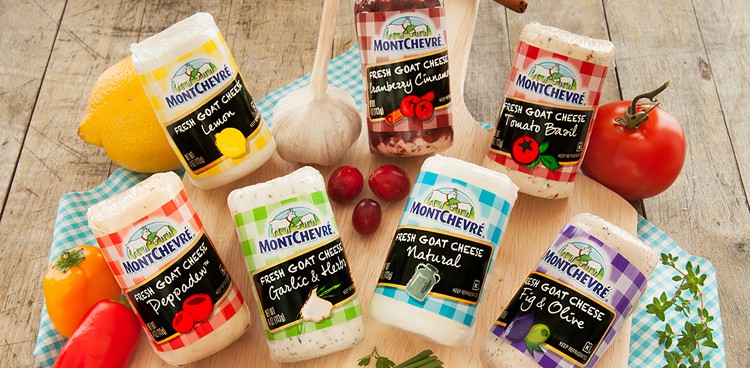
Montchevré, America’s leading provider of goat cheese, just made a huge statement with their release of a new line of fresh, non-GMO goat cheeses. The collection is currently the only non-GMO goat cheese certified by the National Science Foundation. Montchevré first investigated converting to non-GMO three years ago, and are working toward becoming a 100 percent non-GMO.
For Montchevré, it’s about a commitment to a high quality product. In a recent press release, co-founder Arnauld Solandt stated, “We believe that using traditional farming methods, preserving the integrity of the seeds, and reducing the use of pesticides and herbicides is not only important to our environment, but our customers, farmers, and goats as well.” At the 2011 American Cheese Society Conference, Solandt discussed his commitment to the environment and the results of original research conducted by the company—Montchevré’s lab in Iowa analyzes crops, hay, and feed for its milk producers, which include more than 350 independent family farms.
Montchevré’s product line comes out when the use, prevalence, regulation, and labeling of genetically modified (GM) foods continues to be contentious topics for debate both in the US and abroad. On July 29, President Obama signed a GMO labeling bill that left much to be desired for labeling activists. Globally, legislation is widely varied. Between the US and the European Union, regulation exists on opposite ends of the spectrum. The US focuses on the end product being fundamentally the same as conventional foods, while the EU focuses on the fact that genetic modification is inherently a process different from those used to produce conventional foods.
Proponents of GM foods boast that there is an advantage to the producer and consumer of these foods; opponents are concerned with potentially unknown environmental and health impacts. According to an AP-GfK poll, 66 percent of Americans favor labeling of products that contain GM foods, 24 percent remain neutral, and 7 percent oppose. Proponents of GM foods claim that this is mostly due low public understanding of the technology.
Both the World Health Organization and the Food and Agriculture Organization of the United Nations provide excellent resources concerning the debate. I encourage you to explore these resources and more to form your own opinion and then vote with your dollar! No matter your opinion, Montchevré’s move provides cheese lovers with more options to choose from that reflect their values and beliefs.
Photo credit: Montchevré



